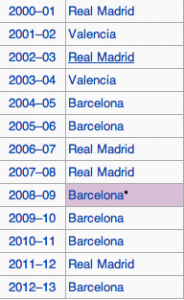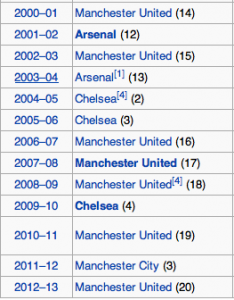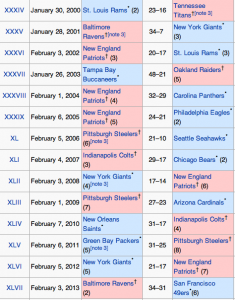An Uneven Playing Field
I’ve lived in the United States for over ten years now, and yet somehow I still struggle to remember the name of my hometown’s American football team (give me a sec… oh that’s right, Atlanta Falcons – Rise up!). Being a Greek South African (born in SA, but 100% of Greek descent), my sports upbringing was dominated primarily by soccer (with rugby and basketball coming in close second). However, the stop-and-go pace of American football as compared to the rhythmic flow of “the beautiful game” has always deterred me from ever watching more than one full quarter of a game. I’d be lying if I told you I knew which NFL team won the most recent Super Bowl or who the best quarterback in the league is right now. In fact I’d be lying if I told you I even cared. But there is one thing that I do envy about American football (the NFL in particular), and that’s the fact that, unlike most European soccer leagues, it embraces an even playing field.
I’m a huge fan of the underdog. Ask me which team I want to win in a match and (unless it involves my beloved Olympiakos) I’m almost always rooting for the non-favored team. Perhaps it stems from being both the only daughter and youngest child in a loud, obnoxious Greek family, but there’s something about an unforeseen victory by an underrated opponent that gives me the utmost satisfaction. With all this being said, those of us who are avid European soccer fans know that the chances of an underdog team ever winning a domestic league championship are slim to none.
If we take a look at the champions of both La Liga and the English Premier League since the start of the 21st century, we see both leagues are dominated by less than a handful of teams. Since 2000, Real Madrid and Barcelona have been the two most undoubtedly successful teams in La Liga (with the rare occurrence of Valencia breaking through El Clasico barrier). Real and Barça have won 32 and 22 titles, respectively, since the establishment of La Liga in 19291. In fact, no other club has won the title on more than nine occasions1. In the EPL, a similar trend can be seen, although it is not quite as strong or as historically rooted.
However, if we take a look at the winners of the Super Bowl over the same time frame, we see a trend that falls on the total opposite end of the spectrum. In the last decade, 9 different teams have won the Super Bowl.
What constitutes for this stark difference in playing fields? In essence, it is the drastically different economies of the NFL and European soccer. The NFL consistently rewards mediocre franchises with the most talented young prospects through a reverse-order draft2. Any team from any city has the same opportunity to compete, and in order to ensure this, the NFL has created a variety of mechanisms to prevent a free market for talent2. For example, player movement and salaries are severely restricted: a rookie draft denies young players the opportunity to have teams bid for their services, a salary cap prohibits teams from spending over a certain amount of money on players, and a franchise tag forces teams to give up two first-round picks to sign each other’s most coveted free agents2.
On the other hand, the nonrestrictive structure of La Liga allows clubs like Barça and Real to financially operate on a higher level and thus make deals that other clubs could only dream of acquiring. Who could forget this year’s transfer of Gareth Bale to Real Madrid for £85.3million, making him the most expensive transfer to date3. The fee eclipsed the £80million that Real paid in 2009 for Cristiano Ronaldo, the second most expensive transfer in the league, but still the highest paid player, making approximately $20.5 million a year, while Barça’s star Lionel Messi comes in close behind with an annual salary of around $20 million4.
Basically, there are no limits to how Barcelona and Real Madrid can acquire talent. However, since they have the best players, they also have the most fans. With more fans comes more money, and with more money, they can afford to buy the best players. It’s a never-ending cycle that gives way to an uneven playing field, but we can’t deny that it generates some incredible soccer.
1. http://en.wikipedia.org/wiki/List_of_...
2. http://www.policymic.com/articles/208...
3. http://www.mirror.co.uk/all-about/gar...
Laurent Dubois's Blog
- Laurent Dubois's profile
- 44 followers






